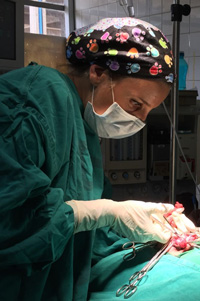
I have spent the past seven months working as the Global Neurosurgery Fellow at Bugando Medical Centre in Tanzania, under the supervision of Dr. Roger Härtl in New York. The hospital is located in Mwanza, a large city on the shores of Lake Victoria, with a catchment area of 13 million people, but until last year the only Neurosurgery Department in Tanzania was located in Dar-es-Salaam, 500 miles away. Today the Neurosurgery Chairman at Bugando, Dr. Emmanuel Saguda, is the only local trained neurosurgeon in Northern Tanzania. Dr. Härtl’s Neurosurgical Mission in Tanzania has been a lifesaver – literally – for this region. But the challenges here are still formidable.
My specialty is pediatric neurosurgery, and after my formal education in medical school and post-graduate neurosurgical training in Lisbon, Portugal, I spent a year as a fellow with Dr. Mark Souweidane at Weill Cornell Medicine in New York. My desire to help patients in under-served areas led me to apply for this fellowship position. I’ve certainly been granted my wish – there are so many children here who need help. For a Western-trained doctor like myself, the emotional shocks occur daily. But each saved life reinforces the drive that brought me here.

This 16-month-old boy is positioned for surgery to remove a posterior fossa tumor that was later classified as a medulloblastoma. The clean gloves full of hot water are used as warmers and prevent peripheral nerve compression during these long surgical procedures.
The children in the photos below have neurosurgical problems that are fairly typical of my daily practice here. Hydrocephalus is a burden disease in Sub-Saharan Africa and many patients have "arrested" cases (meaning there is no longer increased intracranial pressure and normal development has resumed, but the damage it caused remains). In developed nations these children would be treated promptly and would not suffer the many consequences of chronic hydrocephalus. Malnutrition and lack of basic hygiene exacerbate the problem and increase the rate of post-operative complications. And a lack of folic acid supplementation in the local diet is mainly responsible for the higher incidence of myelomeningoceles in this region when compared to the rest of the world.

From left to right: An infant with a devastating combination of malnutrition and hydrocephalus, which compromises a permanent treatment; an infant with a lumbar meningomyelocele, with the typical calf atrophy, positioned for surgery; and a child who was born with an encephalocele, whose parents could not afford a brain CT scan.
Another part of my role here is working on three patients’ databases: one each for traumatic brain injury, traumatic spine injury, and infant hydrocephalus. Accumulating this kind of data is critical to monitoring patient care and analyzing outcomes over time, which in turn provides the basis for evidence-based treatment decisions. I participate in a weekly Skype conference with the team at Weill Cornell, so I have plenty of support from the great team there.
Probably my most important role here is as a teacher. Every day I help local health providers develop their skills in the clinic and in the operating room, so that after I’m gone they will be able to continue to provide effective treatments to their patients. I know that I’m not here to provide charity, but to train the Tanzanian team to become capable health care providers to their patients. They are eager to learn, but they need both training and resources to succeed.

The lack of resources here – the tools, equipment, and supplies we take for granted in the United States or Europe – is a real challenge. We are grateful for the donation of microscopes and other equipment from Western medical suppliers, which can make a huge difference. For example, a few months ago Weill Cornell and Aesculap donated an endoscope to Bugando, which allowed us to establish an intraventricular endoscopy program here. That one donation allows us to spare some patients complicated open brain surgery, and offer them a minimally invasive option that hadn’t been possible before now.
My successes here sometimes seem small, but I know I’m making a difference, one patient at a time and one colleague at a time. I’m sure I’ll be a better person for the time I’ve spent here, and I’ll have the satisfaction of knowing that I’ve made things better in this corner of the world.
More about the Neurosurgical Mission in Tanzania